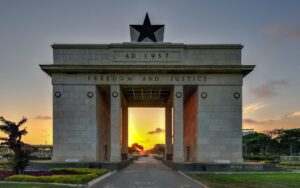Formed from the British Colony of Gold Coast and the Trust Territory of Togoland in 1957, Ghana became the first sub-Saharan country to gain its independence. It has been a stable democracy since 1992. Ghana’s economic strategy since 1992 has focused on macroeconomic stabilization and structural reform in a democratic environment. Within Ghana, a rich economic and political debate informs and influences government policies.
The year 1992 was a turning point in Ghana’s history: a new constitution reintroducing democratic rule was adopted, with the establishment of the Fourth Republic. Presidential and parliamentary elections followed in November and December, respectively. The process of participatory decision-making has continued and strengthened, leading to economic reforms that have produced mostly satisfactory results.
The most critical question on the lips of most citizens is; how economically free is the nation? However, it is important to understand what it means to be economically free, which is the fundamental right of every human to control his or her own labor and property. In an economically free society, individuals are free to work, produce, consume, and invest in any way they please, with that freedom both protected by the state and unconstrained by the state.
In economically free societies, governments allow labour, capital, and goods to move freely and refrain from coercion or constraint of liberty beyond the extent necessary to protect and maintain liberty itself. 100 represents the maximum freedom.

Ghana: Economic freedom, overall index 1995 – 2021
According to the Heritage Foundation, Ghana’s economic freedom score is 59.8, making its economy the 89th freest in the 2022 Index. Ghana is ranked 9th among 47 countries in the Sub-Saharan Africa region, and its overall score is above the regional average but below the world average.
For that indicator, data for Ghana from 1995 to 2021 showed an average value for Ghana stood at a minimum of 56 index points in 1995 and a maximum of 64 index points in 2014. The latest value from 2021 is 59 index points.
Scores are from 0 to 100, higher scores are more desirable i.e. more conducive to economic growth. The lower the score, the greater the level of government interference in the economy and the less economic freedom a country enjoys.
- Free 80 – 100;
- Mostly Free 70 – 79.9;
- Moderately Free 60 – 69.9;
- Mostly Unfree 50 to 59.9; and
- Repressed 0 – 49.9.
Economic freedom over the past five years
Over the past five years, Ghana’s economic growth had been decelerating, but it turned upward in 2021. The expansion of economic freedom over the same five years has resumed its upward trajectory. Aided by significantly higher scores for rule of law (property rights, judicial effectiveness, and government integrity), Ghana has recorded a 3.6-point overall gain of economic freedom since 2017 and has climbed to the top of the ‘Mostly Unfree’ category. The burden on the economy from taxes and government spending is relatively light, but fiscal health has collapsed.
The overall index of economic freedom has 10 components grouped into four broad categories: Rule of Law; Limited Government; Regulatory Efficiency and Open Markets. The overall economic freedom is scored on a scale of 0 to 100, where 100 represents the maximum freedom.
Property Rights
Property rights are recognized and enforced, but the process for getting a clear title to land is often difficult, complicated, and lengthy. Ghana’s legal system is based on British common law and local customary law. There is a history of government intervention in the court system, which suffers from a lack of training as well as delays and inadequate resourcing. Bribery is most pervasive in the judicial system and across public services, per the Foundation.
Government Size
The top individual income tax rate has been cut to 30 percent, and the top corporate tax rate is 25 percent. Other taxes include value-added and capital gains taxes. The overall tax burden equals 14.1 percent of total domestic income. Government spending has amounted to 23.2 percent of total output (GDP) over the past three years, and budget deficits have averaged 10.1 percent of GDP. Public debt is equivalent to 78.0 percent of GDP.
Regulatory Efficiency
Electricity is administered through an inefficient state-owned power distribution system. Bureaucracy is onerous, and there is a general lack of government transparency. The fact that about one in three Ghanaians is illiterate limits productivity. The government is trying to divest 27 highly indebted and loss-making state-owned enterprises including the Tema Oil Refinery, Electricity Company of Ghana, and Ghana National Petroleum Corporation.
Ghana has four preferential trade agreements in force. The trade-weighted average tariff rate is 11.0 percent, and five nontariff measures are in effect. The government generally does not discriminate against foreign investors except in key sectors, but the overall investment regime lacks efficiency and transparency. The financial sector has undergone restructuring, but access to financing remains limited.










